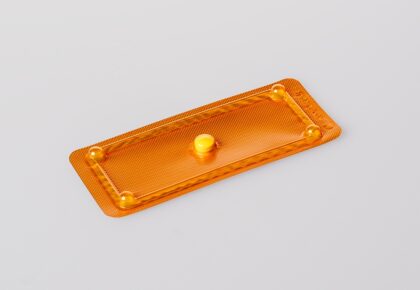- Around 85% Effective
- No STI Protection
- Single use
On this page
- What is the emergency contraceptive pill?
- How effective is the emergency contraceptive pill?
- How does the emergency contraceptive pill work?
- How do I use the emergency contraceptive pill?
- Where can I get the emergency contraceptive pill?
- What stops the emergency contraceptive pill from working?
- What is good about the emergency contraceptive pill?
- Are there any side effects from using the emergency contraceptive pill?
- Can the emergency contraceptive pill cause any serious health problems?
- Reasons why the emergency contraceptive pill might not be a good option for you
- What happens if I get pregnant while I am using the emergency contraceptives pill?
- Can I use the emergency contraceptive pill after I have had a baby?
- What else should I know about the emergency contraceptive pill?
- You might be interested in watching
- Where to get more information and support
What is the emergency contraceptive pill?
The emergency contraceptive pill is a contraceptive method used after sex has occurred. It is used to prevent pregnancy if you had sex with no contraceptive protection. For example, when there is a broken condom, missed or late pills or no contraception used. It is sometimes called the ‘morning after pill’ but it can be used at any time: day or night and up to 5 days after sex.
You can choose emergency contraceptive pills or the non-hormonal copper IUD for emergency contraception.
The emergency contraceptive pill is available in two types in Australia:
- Ulipristal acetate (sold as EllaOne)
- Levonorgestrel (multiple brands)

How effective is the emergency contraceptive pill?
Emergency contraceptive pills are around 85% effective at preventing pregnancy. The ulipristal acetate emergency contraceptive pill (EllaOne), is more effective at preventing pregnancy than the levonorgestrel emergency contraceptive pill.
Another emergency contraception option is the non-hormonal copper IUD. It is more than 99% effective at preventing pregnancy. See non-hormonal copper IUD for more information.
How does the emergency contraceptive pill work?
The emergency contraceptive pill prevents or delays the ovaries from releasing an egg.

How do I use the emergency contraceptive pill?
The emergency contraceptive pill should be taken (swallowed) as soon as possible after unprotected sex. It can be taken up to 4 or 5 days after unprotected sex, depending on the type of pill you take. Speak to a doctor, nurse or pharmacist for further information.

If you have unprotected sex again you may need another dose.
Where can I get the emergency contraceptive pill?
You can buy the emergency contraceptive pill at a pharmacy. You do not need a script. The price will vary depending on the type of emergency contraceptive pill and the pharmacy.
What stops the emergency contraceptive pill from working?
Emergency contraceptive pills may not work if you:
- are already pregnant
- are taking certain medications (check with your doctor, nurse or pharmacist)
- take them too late after unprotected sex
- vomit within 3 hours of taking them.
What is good about the emergency contraceptive pill?
- It provides a safe option to reduce the risk of pregnancy after sex.
- You do not need a script from a doctor or nurse to buy the emergency contraceptive pill.
Are there any side effects from using the emergency contraceptive pill?
The emergency contraceptive pill can change the amount of vaginal bleeding for your next menstrual period. It may also make your period late or earlier, or it may come as you normally expect. If your period is more than 7 days late or lighter than usual, take a pregnancy test as soon as you can.
Other possible side effects for a small number of users can include:
- nausea
- headaches
- dizziness
- abdominal (tummy) pain.
Can the emergency contraceptive pill cause any serious health problems?
There are no known serious risks from taking emergency contraceptive pills.
Reasons why the emergency contraceptive pill might not be a good option for you:
- Have an allergy to any ingredients.
- If you weigh more than 70kg the levonorgestrel emergency contraceptive pill may be less effective. Consider the non-hormonal copper IUD or ulipristal acetate emergency contraceptive pill.
- If you weigh more than 85kg the ulipristal acetate emergency contraceptive pill may be less effective. Consider the non-hormonal copper IUD for emergency contraception.
- Severe liver conditions.
- Severe asthma and using cortisone (prednisolone) tablets (only applies to ulipristal acetate emergency contraceptive pills).
- Are taking certain types of medication, including other contraceptives.
- If you are breastfeeding and taking ulipristal acetate emergency contraceptive pill, it is recommended you express and throw out breastmilk for 24 hours.
Speak to your doctor, nurse or pharmacist for more information on why the emergency contraceptive pill might not be a good option for you.
What happens if I get pregnant while I am using the emergency contraceptive pill?
Emergency contraceptive pills will not harm the pregnancy. It is safe to continue the pregnancy or to have an abortion.
Can I use the emergency contraceptive pill after I have had a baby?
Emergency contraceptive pills are safe to take at any stage after having a baby.
The levonorgestrel emergency contraceptive pill will not affect your breast milk.
The ulipristal acetate emergency contraceptive pill can affect your breast milk. You may need to express and throw out breast milk for 24 hours after taking it.
What else should I know about the emergency contraceptive pill?
- Emergency contraception does not protect you from sexually transmissible infections (STIs). If you have had unprotected sex, you may need an STI screen.
- Use of the emergency contraceptive pill is not an abortion.
- The emergency contraceptive pill is not for ongoing contraception. See other contraceptive options
You might also be interested in:
Where to get more information and support
- Sexual Health Victoria
- Your local pharmacy/chemist
- A doctor or nurse
- Your local community health service
- An obstetrician or gynaecologist
- 1800 My Options phone line 1800 696 784 or website
- Better Health Channel
- Equinox – for transgender services
- Jean Hailes
- Marie Stopes Australia
- Multicultural Centre for Women’s Health
- The Women’s (The Royal Women’s Hospital)


